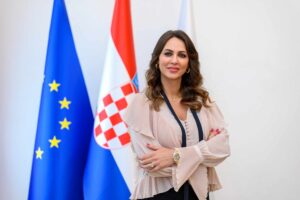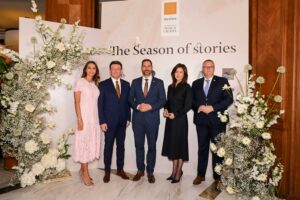The goal by 2030 is for the premium and luxury segment to account for up to 20 percent of total arrivals in Croatia. The Stories – Experience Premium Croatia platform has celebrated its first anniversary. During this period, more than 160 members from six categories have joined the platform, ranging from luxury hotels and villas, to campsites, marinas, travel agencies, and top gastronomic experiences, says Andreja Vukojević, Director of the Tourism Sector at the Croatian Chamber of Economy, in an interview for Diplomacy&Commerce, Focus on Travel. This is the first national initiative for the strategic branding of Croatia through the lens of top-tier experiences, adds Ms. Vukojević.

1. The Stories – Experience Premium Croatia platform, which you and the Croatian Chamber of Economy conceptualized, has marked one year of activity. Can you explain its scope and results in more detail?
Our Stories platform has celebrated its first year of work bringing together Croatia’s top-tier tourism offers in one place. The term “platform” may sound a bit abstract, so let me clarify: this is a strategic communication and development tool that goes beyond a simple marketing campaign—it connects hotels, villas, campsites, marinas, agencies, and gourmet experiences into a unified system of recognisability and serves as the foundation for Croatia’s long-term transformation into a year-round high valueadded tourism destination. Stories represents Croatian authenticity, culture, nature, personal approach, and high level of quality. In other words, Stories speaks the very language that today’s premium guest understands. According to a study we conducted with the agency 505 Savjetovanje, the foundation for this segment in Croatia is not negligible— almost a quarter of hotels, one in ten villas and campsites, and nearly 40 percent of marinas meet the criteria of premium offerings aligned with the expectations of the most demanding guests. This data shows that Croatia has what it takes to compete we just need to tell our story better and continue to develop it.
2. Why is premium tourism important for Croatia?
Premium tourism is not just a segment for Croatia – it is a development strategy. It is a model that delivers more with less – more revenue with fewer visitors, greater satisfaction with less pressure on the environment and infrastructure. Guests who seek premium experiences do not want crowds or mass seasonal tourism. They are looking for quality, peace, nature, and culture—and they are willing to pay for it. In addition, premium guests tend to stay longer, travel outside of peak season, consume local products and services, and very often become loyal visitors. The premium tourism model enables better-paid jobs, less seasonal pressure on destinations, and sustainable, balanced development across the country. Most importantly, the premium segment is aligned with global tourism trends – it caters to guests who now seek authentic and personalized experiences meaningfully connected with the local community. Additional stimulus for development comes from the announcement of more than 6,000 new hotel rooms by 2027.

3.What are the other plans, and what is the ultimate goal?
That’s right—over 6,000 new highcategory hotel rooms have been announced. This will certainly be a development boost, but I must emphasize that the classification itself is not the ultimate goal. This high-category accommodation is the foundation on which we must build our content – meaning, we need to develop complete experiences, authentic stories, and an unquestionable level of service. Recommendations from the study I previously mentioned provide guidance for future actions. For example, we need to attract world renowned luxury brands such as Aman, Six Senses, and Rosewood, while at the same time developing our own authentic boutique concepts that merge local character with a high level of sophistication. The goal by 2030 is for the premium and luxury segment to account for up to 20% of total arrivals, but also to be responsible for a significant share of tourist spending—which already exceeds €1.4 billion annually in this segment. So, we are no longer chasing numbers at any cost, but rather focusing on quality and long-term impact.
4.How do we compare to competing countries – Italy, France, Spain, Greece?
The study conducted by the Croatian Chamber of Economy (HGK) and 505 Consulting provided us with a realistic and very detailed insight into where Croatia currently stands compared to established Mediterranean premium destinations such as the French Riviera, Marbella, Mykonos, and the Amalfi Coast. Our main weakness at the moment lies in perception – while competitors received an average score above 4.5 on a scale of 1 to 6, Croatia was rated at 3.86. This indicates that we are still not sufficiently perceived as a premium destination. There are several reasons for this: we still lack globally recognized high-end hotel brands, we need to strengthen the diversity of the offer, and organize more events. Another important aspect is that we must enhance our promotional efforts in source markets. On the other hand, Croatia undeniably offers what new generations of travellers value most: natural beauty, peaceful destinations, gastronomic authenticity, and a personalized approach. Our socalled “quiet excellence”, as we like to call it, can and must become our answer to the competition. Our opportunity lies in this sophistication, untouched nature, boutique hotels with a soul, and local wines and wineries that tell a story. We are now working to articulate that clearly, showcase it, and share it with the world.
5. Branding a destination through authentic premium experiences is becoming increasingly important. What would you highlight specifically?
Experience-based branding is the cornerstone of our strategy. We don’t want to offer guests just a four- or five-star room – we want to offer them a destination, an experience that enriches and emotionally touches them. There are numerous examples and their number is growing: we’re talking about vineyard dinners with top chefs pairing gourmet cuisine with local wines; wellness retreat weekends in Gorski Kotar; boutique hotels nestled in old stone palaces; wine tours through Slavonia offering a completely different experience than the coast; or, on the other hand, exclusive nautical routes through hidden coves. According to our research, authentic gastronomy and original local experiences stand out as the foundation for developing premium tourism in Croatia. Our task is to make those experiences accessible, yet preserve their uniqueness. These are the things that guests remember – and why they return.

6. If we move away from the premium segment for a moment – what kind of tourist season do you expect this year?
This year, we expect a stable and well-balanced season. The focus is increasingly shifting away frommerely counting arrivals toward tracking actual value – how much guests spend, how long they stay, how satisfied they are, and what kind of experiences they’re having. Records are not necessarily the goal – quality is the goal. If we manage to achieve balanced development throughout the season, with an emphasis on the pre- and post-season, especially through the premium, health, and cultural tourism segments – that will be a major step forward for the entire sector. Our aim is to create experiences that are meaningful, that enrich both the guest and the destination. Ultimately, numbers matter, but it is even more important to put those numbers in the context of sustainability, and long-term, balanced, and year-round development.
7. Where do you see Croatia in 5-10 years, and what should be its “leitmotif”?
I see Croatia as a recognizable destination of so-called quiet sophistication, a country where success is not defined by lavish spending, but by exceptional quality of experience. A place where success is not measured in square meters of swimming pools, but in personal connection, authenticity, and attention to detail — where success is premium tourism. I see us as a destination where silence is a value, not emptiness; where the guest knows they are not part of a crowd, but that the experience is tailored specifically for them. I see us as a year-round destination with a sustainable and diverse offer, with top-quality tourism professionals and guests who come not only to see, but to truly feel. Ultimately, I see us as a destination people talk about to their loved ones, a destination they appreciate, and one that enjoys unmatched word of-mouth reputation.